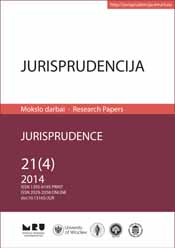TEISĖ KREIPTIS Į EUROPOS SĄJUNGOS TEISINGUMO TEISMĄ GINČIJANT EUROPOS SĄJUNGOS INSTITUCIJŲ NEVEIKIMĄ
ACCESS TO THE COURT OF JUSTICE OF THE EUROPEAN UNION SEEKING TO CHALLENGE THE INACTION OF EUROPEAN UNION INSTITUTIONS
Author(s): Arvydas BudnikasSubject(s): Law, Constitution, Jurisprudence
Published by: Mykolas Romeris University
Keywords: EU institutions; actions for failure to act; TFEU Article 265; privileged applicants; non-privileged applicants; right of action.
Summary/Abstract: The actions for failure to act against European Union institutions are governed by the Treaty on the functioning of European Union (hereinafter also referred to as TFEU) Article 265. The purpose of these actions is to constitute a fact that European institution failed to act by not adopting legal measure when it had the legal obligation to adopt it. The action for failure to act can be lodged by privileged applicant, i. e. member state or European Union institution. Also, the action can be lodged by non-privileged applicant, i. e. private natural or legal person. It is noteworthy that in legal doctrine the right to action (in latin called locus standi) under Article 265 of the TFEU has been analyzed insufficiently compared to the right to action under Article 263 of the TFEU, which governs the actions for annulment. It is not clear under what conditions applicants can bring an action for failure to act before the Court of Justice of the European Union. Further uncertainty occurs regarding the right to action of private applicants under Article 265 of the TFEU. As it seems from the wording of Article 265 of the TFEU, only in cases where European Union institution fails to address to that private applicant any act other than a recommendation or an opinion, private applicant is entitled to bring the action for failure to act before the court. Questions in particular arise whether private applicant can use the action for failure to act in case the non-adopted legal act would be addressed to third party, but inevitably such inaction influences the legal interests of such private applicant. For the above mentioned reasons, this scientific article aims to disclose the criteria for the right to action under Article 265 of the TFEU regarding privileged and nonprivileged applicants. The article consists of three parts. In the first part, under what terms the action for failure to act can be lodged by member states and European Union institutions is analyzed. Further, in the second part, the same analysis is performed regarding private natural and legal persons. Finally, the third part provides necessary conclusions and remarks.
Journal: Jurisprudencija
- Issue Year: 21/2014
- Issue No: 4
- Page Range: 1003-1027
- Page Count: 25
- Language: Lithuanian

